-
- Passenger Ship Website - www.simplonpc.co.uk - Simplon
Postcards Home
- Recent Updates - Search - Copyright Information - Contact Simplon
- This
website has no connection with any shipping company, cruise line,
boat operator or other commercial organisation
-
-
- Harland
and Wolff Standard Motorships
-
- Page
1 - The Belfast SS Pioneers
-
-
- Coast Lines had been acquired
by Lord Kylsant's Royal Mail Steam Packet group in 1917. The
pioneering large passenger motorships of the Royal Mail group,
including ships for White Star, Union-Castle and Royal Mail itself,
are well known. In 1929, the Belfast SS Co received the first
of three 3700ton Harland and Wolff motorships, the Ulster Monarch, displaying a cut down version of the standard two-funnelled
outline. The second and third ships were delivered in 1930, and
were named Ulster
Queen and Ulster Prince. They were the world's first diesel
cross-channel ships, and a fourth ship smaller ship, the Innisfallen, was delivered for the City of
Cork SP Co.
-
- The design was developed
over the next 17 years through nine further ships, all with just
a single funnel. Arguably what was a pioneering design in 1929
was rather outdated by the time of the last ship in 1957. That
two of these ships are still in service in 1999 shows how well
they were built, now owned by the same company following the
takeover of Royal
Olympic (Orpheus,
ex-Munster (1948) by Louis
Cruise Lines (Princesa
Amorosa, ex-Scottish
Coast (1953). Only one of the initial trio
returned to Belfast SS service after WW2, the Ulster Monarch. She was scrapped in 1966.
-
-
- The 13 ships in chronological
order, with links to their respective pages:-
- 1929 Ulster
Monarch (Belfast SS) - This Page
- 1930 Ulster
Queen (Belfast SS) - This Page
- 1930 Ulster
Prince (Belfast SS) - This Page
- 1930 Innisfallen
(City of Cork SP) - Page
2
- 1936 Royal Scotsman
(Burns & Laird) - Page 3
- 1936 Royal Ulsterman
(Burns & Laird) - Page 3
- 1937 Leinster
(British and Irish) - Ulster Prince - Page 4
- 1938 Munster
(British and Irish) - Page 4
- 1947 Innisfallen
(City of Cork SP) - Page
2
- built by Wm.Denny
- 1948 Leinster
(British and Irish) - Page 4
- 1948 Munster
(British and Irish) - Page 4
- 1953 Irish Coast
(Coast Lines) - Page
3
- 1957 Scottish
Coast (Burns & Laird) - Page 3
-
- Coast Lines Pages:-
- Belfast
SS History
- Overview of the Liverpool-Belfast night boats
- Belfast
SS Motorships
- Detailed history of the Liverpool-Belfast motorships - this page!
- Belfast SS Car Ferries
- Coast
Lines
- Header Page
- P&O
Ferries
- H&W
Motorships Page 1
- Belfast SS
- H&W
Motorships Page 2
- City of Cork SP Co
- H&W
Motorships Page 3
- Burns & Laird Line
- H&W
Motorships Page 4
- B&I SP Co
-
- References:-
- The B&I
Line: by Hazel P.Smyth - Gill & Macmillan 1984
- Across the Irish
Sea: by Robert Sinclair - Conway Maritime 1990
- Irish Passenger
Steamship Services - Volumes 1 & 2: by D.B.McNeil - David
& Charles 1969
-
-
-
-
-
-
-
- Ulster Monarch
- (Belfast
SS: 1929-1966)
-
-
- In 1929, the Belfast SS
Co received the first of three 3700ton Harland and Wolff motorships,
the Ulster Monarch, displaying a cut down version of the
standard two-funnelled outline. The second and third ships were
delivered in 1930, and were named Ulster Queen and Ulster
Prince. They
were the world's first diesel cross-channel ships, and a fourth
ship smaller ship, the Innisfallen, was delivered for the City of
Cork SP Co.
-
- Ulster Monarch, was delivered with a light grey
hull, but the colour proved to be impractical and was later replaced
with black. The fornt of the boat deck beneath the bridge was
originally open, but was soon enclosed with wooden-framed windows.
In 1938, a blue band was added to the traditional red and black
Belfast SS funnel, to make them to same as the new Burns &
Laird colours applied to the first two standard motorships added
to that fleet. There was talk of amalgamation of the two fleets
at the time, but nothing came of it. The black hull was applied
around the same time. Ulster Monarch was the only one
of the trio to return after WW2. Ulster Prince was wrecked at Nauplia in Greece in April 1941,
whilst trying to evacuate UK troops. She was destroyed the following
day on 25th April 1941 by Stuka dive bombers. Ulster Queen was running the Liverpool-Belfast
service alone in 1940 when she ran aground of Maughold Head on
the Isle of Man on 28th February. She was not refloated until
27th March whne she was taken to Belfast for repairs. She was
then requisitioned by the Admiralty and converted into an auxiliary
anti-aircraft cruiser. HMS
Ulster Queen
was substantially modified with the removal of her boat deck
and one funnel. Armour plating was added to the hull sides and
she had been armed with six 4.0in guns plus smaller AA weapons.
The conversion was successful and she was purchased outright
by the Admiralty. HMS
Ulster Queen
served with the Russian convoys, in the Mediterranean and in
the Far East before being paid off on 1st April 1946. The modifications
were too substantial to return her to passenger service, and
she was sold for scrap.
-
- Ulster Monarch's funnels reverted to red and black
after the war, and shortened funnels were installed to reduce
top weight. This class was renowned for rolling in high seas.
Ulster Monarch was the only one of the initial trio which
returned to Belfast SS service after WW2. She was scrapped in
1966.
-
- Complete history of Ulster Monach
-
-
- An early
official Belfast SS card of Ulster Monarch, with original
light grey hull, and before windows were added on the forward
boat deck.
- The
Liverpool-Belfast route was marketed as the Ulster Imperial Line,
which continued until after WW2.
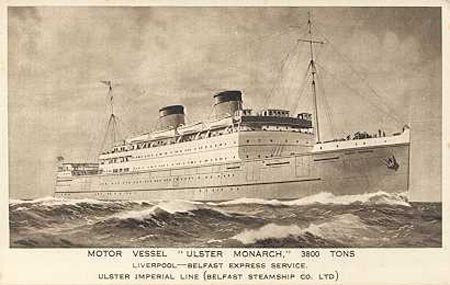
-
-
- Another
official Belfast SS card of Ulster Monarch, with original
light grey hull.
- The
boat deck beneath the bridge was protected with windows at an
early stage - compare with the card above.
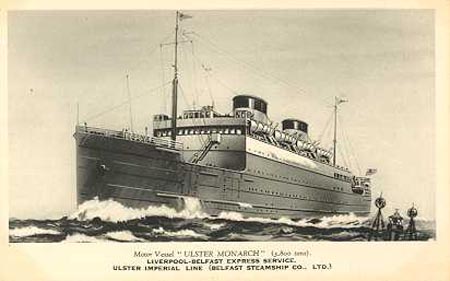
-
-
- The
blue version of the official Belfast SS card of Ulster Monarch
shown above.
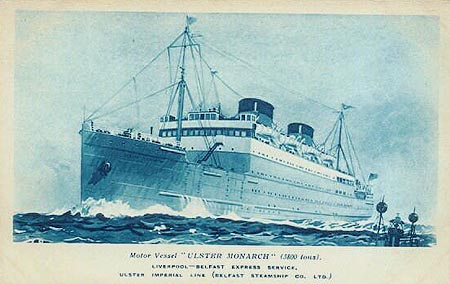
-
-
- An official
Belfast SS card of a single first class cabin on Ulster Monarch.
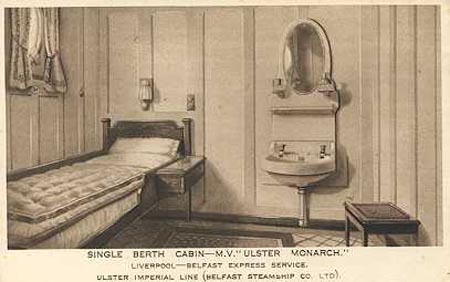
-
-
- An W.E.Walton
photographic card of Ulster Monarch, with original light
grey hull.
- The
colour proved to be impractical and was later replaced with black.
- An early
card - the boat deck beneath the bridge is not yet protected
with windows.
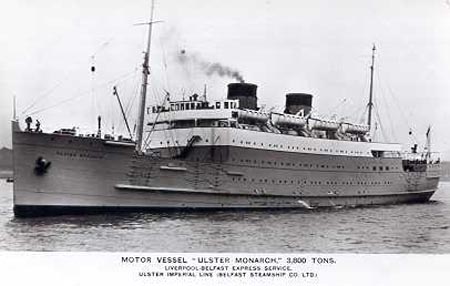
-
-
- An official
Belfast SS colour card of Ulster Monarch.
- In 1938,
a blue band was added to the traditional red and black Belfast
SS funnel, to make them to same as the
- new
Burns & Laird colours applied to the first two standard motorships
added to that fleet. There was talk of
- amalgamation
of the two fleets at the time, but nothing came of it. The black
hull was applied around the same time.
- Click to open larger image in new window
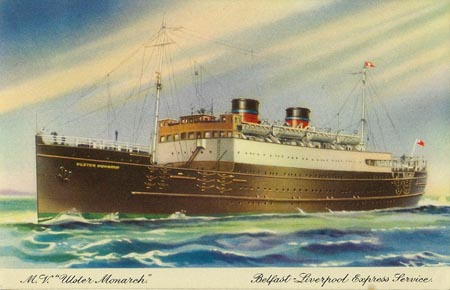
-
-
- An official
Belfast SS postcard of Ulster Monarch.
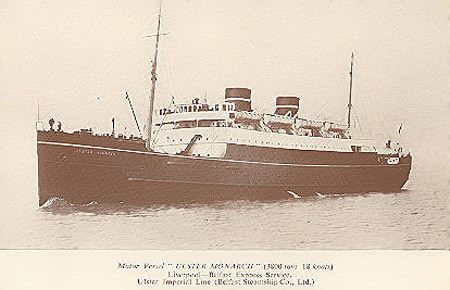
-
-
- A postwar
official Belfast SS colour card of Ulster Monarch, after
funnels reverted to red and black.
- The
Ulster Monarch was the only one of the trio to return
to Belfast SS service after the war.
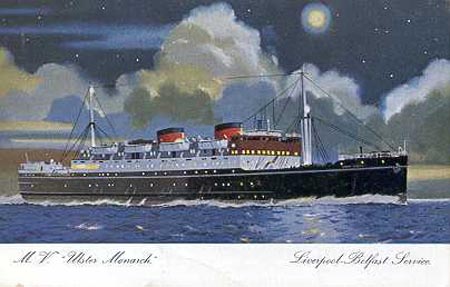
-
-
- Another
postwar official Belfast SS colour card of Ulster Monarch,
after funnels reverted to red and black.
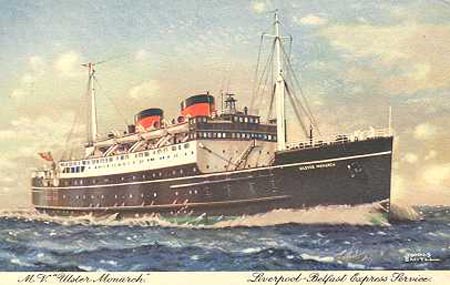
-
-
- An interesting
card of Ulster Monarch, with a Dublin boat astern, at
Liverpool Pier Head.
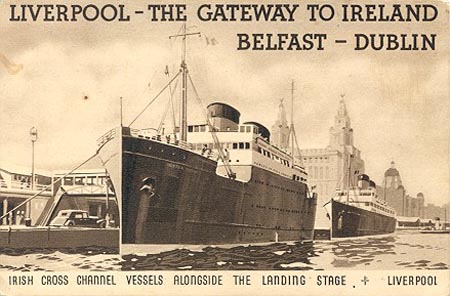
-
-
- Another
postwar official Belfast SS colour card of Ulster Monarch.
- This
shows the shortened funnels applied to reduce top weight. This
class was renowned for rolling in high seas.
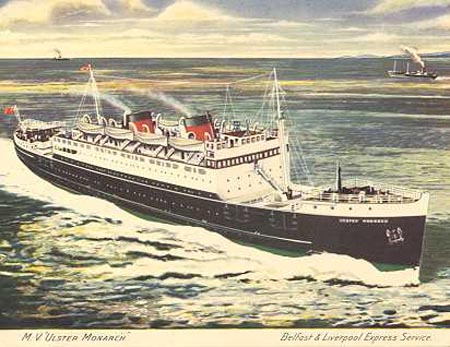
-
-
- A late
official card of Ulster Monarch, with later small funnels.
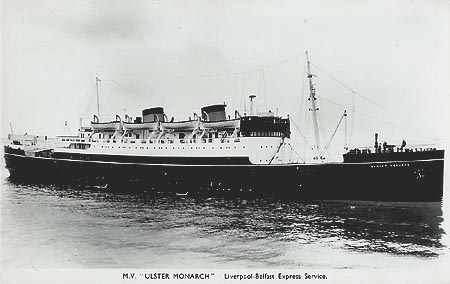
-
-
-
-
-
- Ulster Queen
- (Belfast
SS: 1930-1941)
-
- Ulster Queen was running the Liverpool-Belfast
service alone in 1940 when she ran aground of Maughold Head on
the Isle of Man on 28th February. She was not refloated until
27th March whne she was taken to Belfast for repairs. She was
then requisitioned by the Admiralty and converted into an auxiliary
anti-aircraft cruiser. HMS
Ulster Queen
was substantially modified with the removal of her boat deck
and one funnel. Armour plating was added to the hull sides and
she had been armed with six 4.0in guns plus smaller AA weapons.
The conversion was successful and she was purchased outright
by the Admiralty. HMS
Ulster Queen
served with the Russian convoys, in the Mediterranean and in
the Far East before being paid off on 1st April 1946. The modifications
were too substantial to return her to passenger service, and
she was sold for scrap.
-
-
- An early
official Belfast SS card of Ulster Queen, without widows
on the forward boat deck.
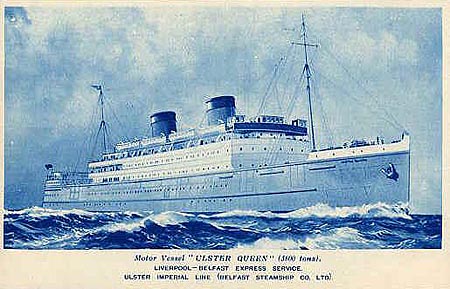
-
-
- An official
Belfast SS card of Ulster Queen, with original light grey
hull.
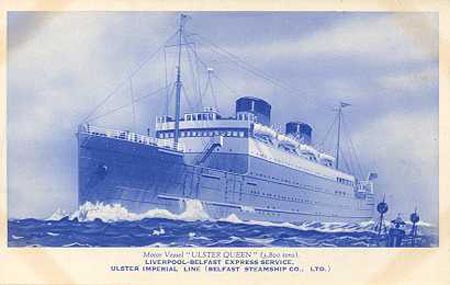
-
-
- An official
Belfast SS card of Ulster Queen - colour & font variation
on the card above.
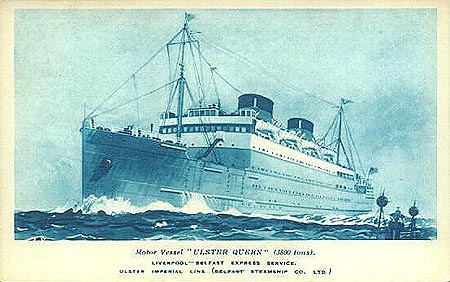
-
-
- W.E.Walton
photographic card of Ulster Queen
- Click to open larger image in new window
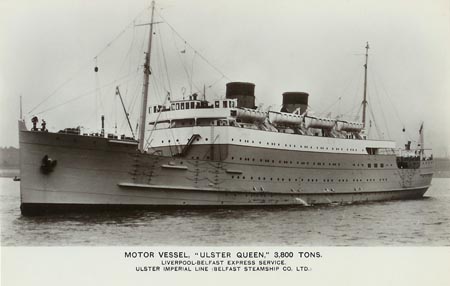
-
-
- An W.E.Walton
photographic card (on a painted sea) of Ulster Queen,
with original light grey hull.
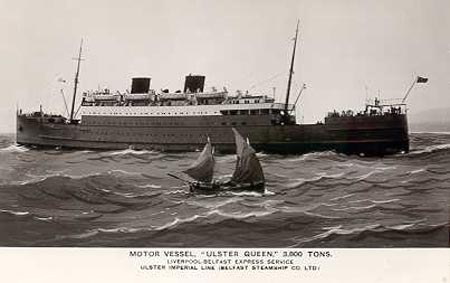
-
-
- An unidentified
photographic card of Ulster Queen, with the light grey
hull already showing signs of wear.
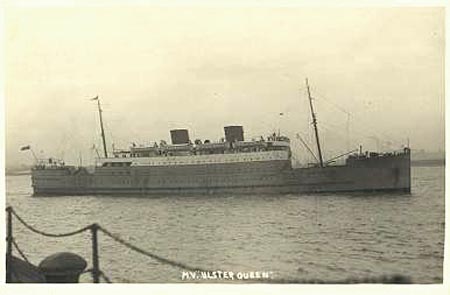
-
-
- A different
copy of the photographic postcard above of Ulster Queen.
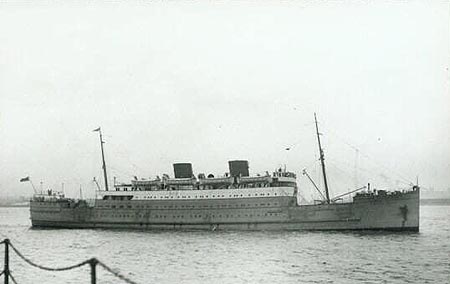
-
-
- An unidentified
photographic card of Ulster Queen.
- All
three sisters served with distinction and reliability during
WW2. Ulster Queen was heavily converted to a fighter
- direction
ship, and did not return to commercial service after the war.
She was laid up, and eventually scrapped in 1950.
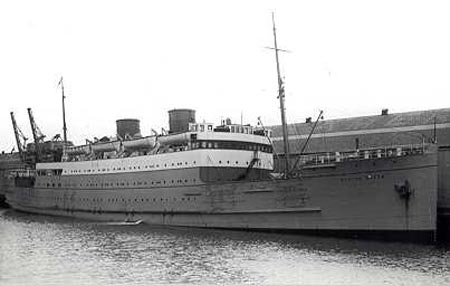
-
-
- Photographic
postcard of Ulster Queen on the Mersey.
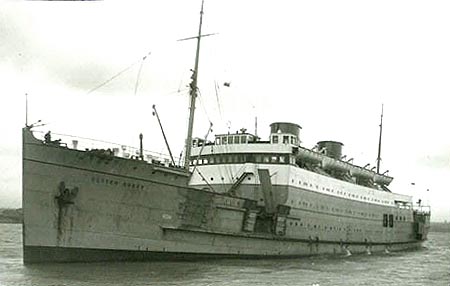
-
-
- Photographic
postcard of Ulster Queen on the Mersey.
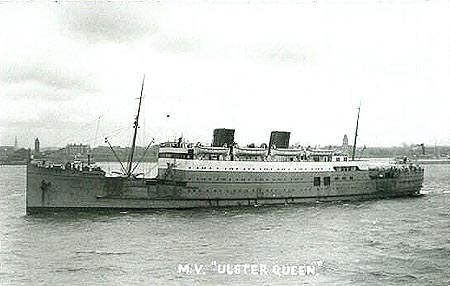
-
-
- Photographic
postcard of Ulster Queen with black hull, on the Mersey.
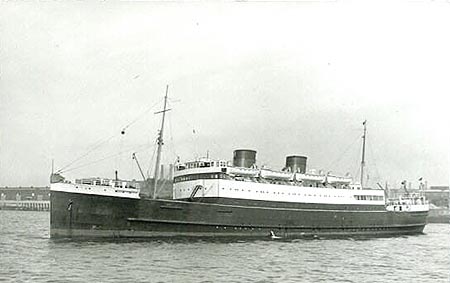
-
-
- Photographic
postcard of Ulster Queen with black hull, on the Mersey.
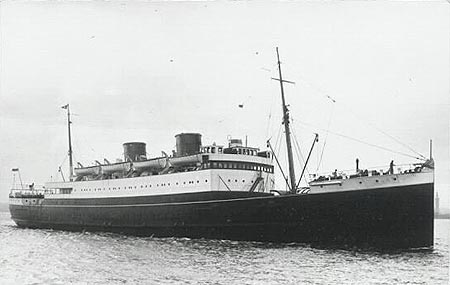
-
-
- Photographic
postcard of Ulster Queen with black hull, on the Mersey.
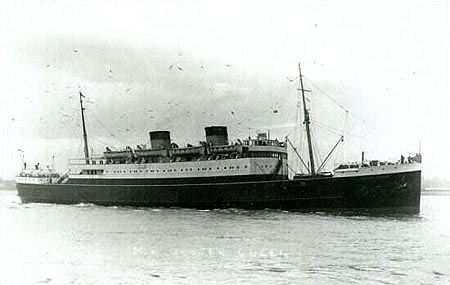
-
-
- Photographic
postcard of Ulster Prince on war service.
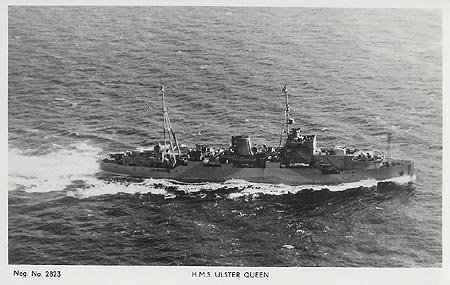
-
-
- Photographic
postcard of Ulster Prince on war service.
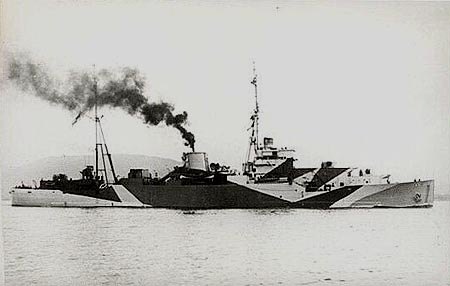
-
-
-
-
-
-
- Ulster Prince
- (Belfast
SS: 1930-1941)
-
- Ulster Prince was wrecked at Nauplia in Greece
in April 1941, whilst trying to evacuate troops. She was destroyed
the following day on 25th April 1941 by Stuka dive bombers.
-
-
- An official
Belfast SS card of Ulster Prince, with original light
grey hull.
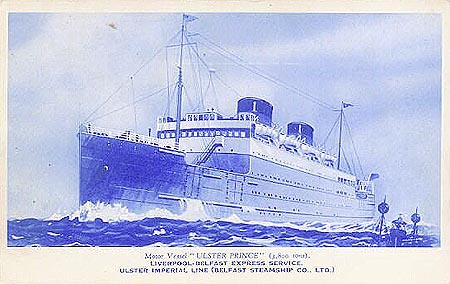
-
-
- An official
Belfast SS card of Ulster Prince, with original light
grey hull.
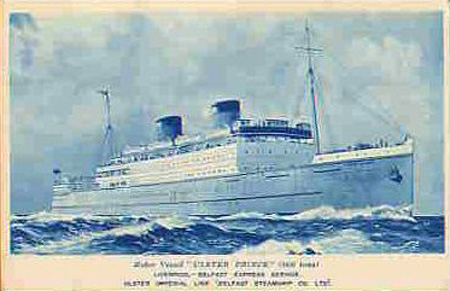
-
-
- An W.E.Walton
photographic card (on a painted sea) of Ulster Prince,
with original light grey hull.
- Ulster
Prince was
lost during the evacuation of Greece in 1941.
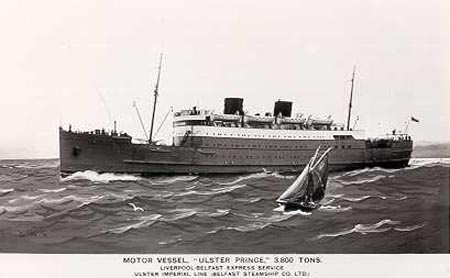
-
-
- An unidentified
photographic card (BSS official?) of Ulster Prince.
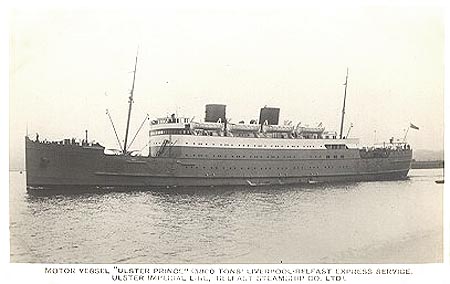
-
-
- Photographic
postcard of Ulster Prince with black hull.
- Location
unknown (it looks neither like Liverpool nor Belfast!)
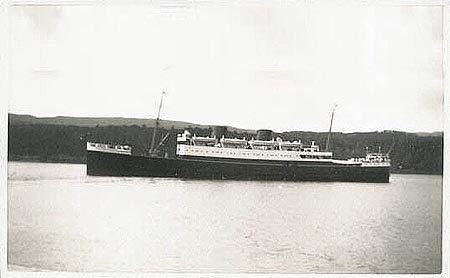
-
-
- Photographic
postcard of Ulster Prince with black hull and "Burns
& Laird" funnels, on the Mersey.
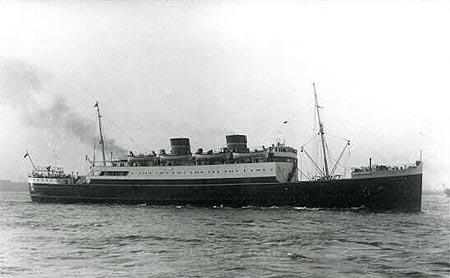
-
-
-
-
-
-
- 1937
Ulster Prince (Belfast SS)
-
- This ship was transferred
to Belfast SS after WW2, to run the service alongside Ulster
Monarch, the only survivor of the original trio. She was
built as the Leinster in 1937 - Follow this link
for her history.
-
-
-
-
-
- Coast
Lines
- P&O
Ferries
- H&W
Motorships Page 1
- H&W
Motorships Page 2
- H&W Motorships Page 3 - H&W Motorships Page 4
- Top of Page - Simplon Postcards - Recent Updates - Simplon Postcards - Home Page
-
-

































































